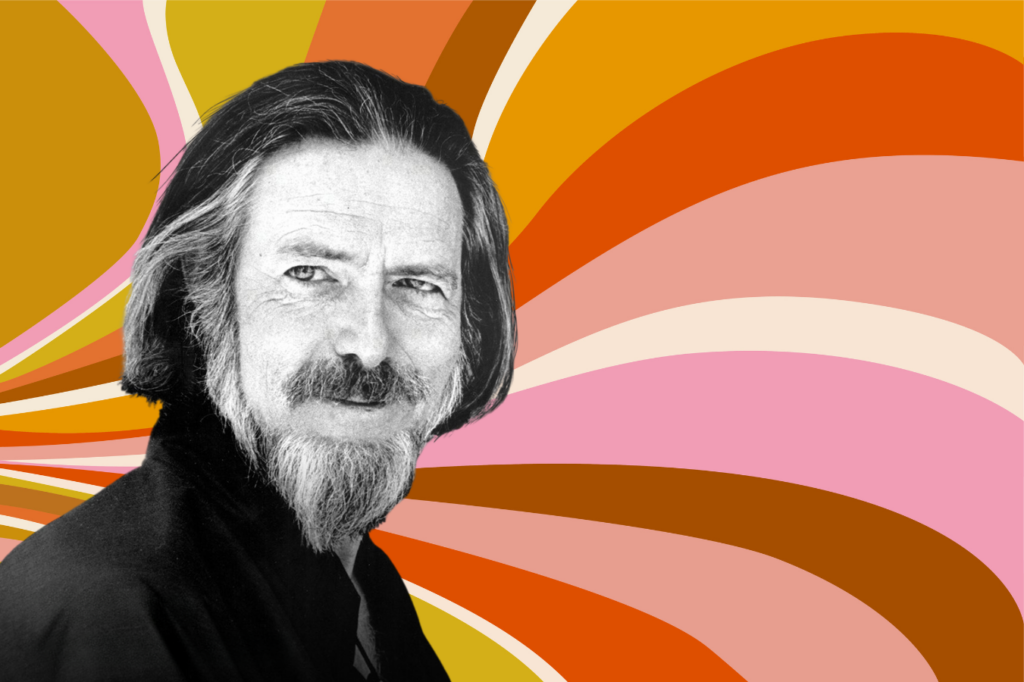Alan Watts was an English writer, disseminator and self-proclaimed “philosophical entertainer”, best known for introducing Buddhist, Taoist, and Hindu philosophy to Western countries in a way that could be absorbed.
He passed away on the 16th of November 1973, marking the 50th anniversary of his death this year. While many may recognize him as a recurring narrator in Volvo advertisements and music, his influence goes far beyond that, offering ideas relevant to today’s culture.
He shaped his beliefs and philosophies early in his life. At the age of 15, he boldly declared himself a Buddhist, and by 19, he authored his first book on Zen. Subsequently, he studied Theology, leading to his celebrated book The Wisdom of Insecurity in 1951. This work represented a radical shift in conventional thinking about the pursuit of security.
He proposes that, instead of seeking security, it would be wiser to understand that we suffer and perish due to the very efforts we make to avoid suffering and perishing. “Nothing is more powerful than emptiness”, not in a nihilistic sense, but as a call to live in the present without the anxiety generated by the mirage of time and history. In an era of anxiety, uncertainty, social media, and human conflicts, the acknowledgement that salvation and security only begin when we realise there is none becomes a superpower.
Later, Watts spent around half a decade as an Episcopal priest and emerged as a public pop philosopher, bridging the East-West gap and leaving an indelible mark on the counterculture of the 1950s and 1960s. His book, The Way of Zen, released in 1957, debunked and criticized much of his earlier work, guiding readers through the rich histories of Buddhism and Taoism, laying the foundation for the emergence of Zen Buddhism in Western culture. It is a contemplative tradition that places a strong emphasis on direct experience and meditation to attain enlightenment. Encouraging a direct, experiential comprehension of reality, it often fosters this understanding through practices such as seated meditation and mindful awareness.
In an era dominated by materialistic societies and the mechanization of existence, Watts's work unfolded against the backdrop of emerging psychological paradigms. These currents significantly enriched our understanding of human nature, shaping models and principles.
Watts also explored human consciousness and psychedelics. The Joyous Cosmology emerged during the dawn of the 1960s psychedelic movement. At that time, scientific exploration of hallucinogenic drugs gained significant traction. The 1970s, however, saw the prohibition of psychedelic research, and the fervour surrounding these substances gradually waned.
While initially acclaimed for its focus on psychedelics, the book's popularity dwindled along with the decline of the drug scene. It experienced a revival in the 1990s when substances like LSD regained attention, leading many to rediscover or encounter the book for the first time during this resurgence.
In Watts’ view, the ego represents the illusion of a separate and fixed self, and he advocated for a more expansive understanding of identity that aligns with the interconnected nature of reality as suggested by certain Eastern philosophies.
In The Joyous Cosmology begins addressing his concerns about Western culture's distorted perceptions, particularly in terms of ego alienation, suggesting that psychedelics could provide insights into these issues. He then shares his personal experiences under the influence, providing a glimpse into the tangible sensations arising from altered consciousness. The book concludes with an interpretation of the mind's odyssey with psychedelics, challenging the prevailing belief in the dominance of the ego.
A nomad in pursuit of wisdom, Alan Watts traversed the nation, sharing his insights through public lectures and popular radio shows. His life, ending prematurely at 58, likely due to issues with alcoholism, revealed a flawed but brilliant mind.
How can his ideas help us today?
Alan Watts, a philosopher who bridged Zen Buddhism with Western thought, warned us against the pitfalls of incessant thinking. Describing thoughts as internal chatter, he contends that constant mental dialogues are a source of everyday anguish. While Watts acknowledged the value of rational thought, he emphasized moderation, likening the mind to a tool to solve problems rather than a relentless master.
Epic thoughts, commonplace yet burdensome, such as the pressure to survive, succeed, or conform to societal expectations, consume our minds and prevent us from fully experiencing the external world. Watts advocated for surrendering to the present moment, by embracing our current state and feelings allows a profound connection with reality. He identified the ego and self-concept as the primary culprits, constructed from external influences and societal norms, veiling our true nature.
He is well known for his criticism of modern civilization. We are anxious animals searching for gratification to fill an unfillable void. “The animal tends to eat with its stomach and the man with his brain. When the animal’s stomach is full, he stops eating, but the man is never sure when to stop. When he has eaten as much as his belly can take, he still feels empty, he still feels an urge for further gratification.”
We are so desperate for pleasure that we can never get enough of it, eventually becoming slaves of our own desires. The brain, even though the body might get ill, wants to go on and on, because the brain is much more preoccupied about the future than the present, and though we know that we do not have an indefinitely long future, we end up thinking more about it than trying to remain in the present.
Alan Watts argues that our modern, fast-paced lifestyle, fixated on endless stimulation, creates a vicious cycle. Our desire for constant pleasure leads to a bombardment of noise and distractions, leaving us incapable of experiencing genuine joy.
He points out our society's skewed perspective on time and rest, emphasizing how we prioritize watching TV and chasing fantasies over the value of sleep. This relentless quest for perpetual stimulation, he suggested, comes at the expense of true pleasure, making us insensitive to life's subtler joys. By constantly seeking more, we risk missing out on the authentic experiences that bring us fulfilment.
Watts challenged our understanding of wants and desires, asserting that the civilized person often confuses by-products like success, fame, or wealth with genuine aspirations. He encouraged us to question our pursuits and recognize the shadows of substance that often occupy our focus.
In today’s rapid culture, where distraction and lack of presence are prevalent, these theories and practices offer valuable tools. The practice of meditation promotes being fully engaged in the present moment, countering stimuli and information overload, fostering a deeper connection with one’s surroundings and experiences. In a culture that glorifies multitasking and constant busyness, incorporating these practices can provide a much-needed antidote.
Watts paid special attention to our connection with nature and expressed his ecological concerns early in his life. He understood that we did not have to go to the woods to disconnect from society’s busy life but to connect with it. “If you go off into a far, far forest and get very quiet, you’ll come to understand that you’re connected with everything”.
The absence of an understanding of the fundamental unity between organism and environment is a grave and perilous delusion. In a society armed with vast technological prowess, the estrangement between humanity and nature can result in the application of technology with a hostile intent.
His resonant, prophet-like voice, shaped by an English public-school education, echoed with wisdom. Yet, what intrigued me most was not just the richness of his laughter but the depth of his philosophical insight. Alan Watts stands out as a pioneer in translating Eastern philosophical concepts to the West, challenging conventional interpretations with a uniquely British blend of scepticism and humour, often mocking the common Western notion of the self as a “skin-encapsulated ego”.
Despite his personal shortcomings, Watts’ legacy radiates as a clear thinker and writer. Upon reflection of Alan Watts’ work, it is undeniable that his impact reverberates far beyond his mortal years, leaving us with a rich tapestry of thought and contemplation to dream of a better humanity.


